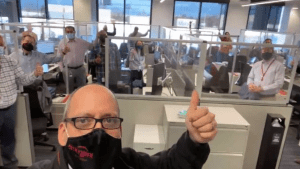
How This One Research Training Program Has Impacted The Careers of Over 17,000 Scientists
Maryland-Based Bio-Trac has Provided Advanced Training for Research Scientists for over 33 Years
January 22, 2019
There is a company in Maryland that has been on the cutting edge of biomedical research training for over 33 years. This company has trained more than 17,000 bench scientists from all corners of the globe, providing them with the latest techniques and skills needed to move their research forward and push the boundaries of scientific possibility. This company is Bio-Trac.
So how is one company able to make such an impact on so many biomedical research scientists while maintaining a track record of educational excellence? It all started with the ideals of one well-respected scientist, Roland Nardone, Ph.D. He was a man who believed in the value of continuing education, was a stickler for proper procedures, and had the foresight to consistently spot the next big thing in research.
In the late 70’s and early 80’s, Dr. Nardone was asked to conduct tissue culture related training workshops at the National Institute of Health on behalf of NIDDK and EEO. Later on he established a training center at Catholic University in 1984, The Catholic University’s Center for Advanced Training in Cell and Molecular Biology (CATCMB). “The first training course was on cell culture techniques,” recalls Dr. Nardone’s colleague at The Catholic University, John Golin, Ph.D. ”That training led to additional workshops in immunology and Recombinant DNA Methodology”.
Dr. Nardone started conducting training workshops at the NIH where there was space for additional workshops. “He had a built-in audience there,” Dr. Golin says, “and he continued to invite his colleagues from Catholic to lead workshops.” Dr. Nardone’s reputation in the field also made it possible for him to attract subject matter experts from around the country to be part of the teams that taught each workshop. “My father believed in a team approach,” says his son Mark Nardone. “He believed there was value in having more than one voice speak on a topic.”
Dr. Nardone realized there was a need for intensive training in the latest technologies. He believed that proper training and a consistent approach to the new methods developed in the field would yield long-term benefits. Scientists would have a uniform set of tools and procedures that allowed them to communicate with one another within the same context. Equipment manufacturers would know that their materials were being utilized properly in the lab for best results. Labs could expect that the bench researchers they hired had a working knowledge of the intricacies of the tests they would perform. All in all, standards and training in protocols would elevate the reliability of the results of work in the lab, saving money and maintaining public confidence in the reliability of study findings in the process.
In 1985, Dr. Nardone invited his son to join him in founding Bio-Trac. Mark Nardone was well aware of the excellence in training his father envisioned. Early on, Mark had worked in his father’s lab. “I knew from personal experience that my father emphasized the importance of sterility and proper cell culture technique and insisted that these practices be followed,” explains Mark with a laugh. “I had to demonstrate the ability to subculture cell lines on a lab bench instead of in a hood without introducing a contamination into the culture. Once it was proven over a length of time that I could do this, I was allowed to use a tissue culture hood for subculturing.”
Bio-Trac’s reputation for providing meaningful training on the latest techniques grew over the years. Their name was not only respected within the academic and government community but within industry circles as well. Some of the top biopharma industry leaders began hiring Bio-Trac to provide custom training programs for their research teams to ensure their researchers were using the very latest techniques and had the skills they needed to move their programs forward.

Over 17,000 researchers from all 50 states, and from dozens of countries around the world have since traveled to Maryland to receive advanced training at Bio-Trac workshops. The workshops continue to cover topics that are on the cutting edge of research, led by some of the foremost experts in the field. The quality of the courses, the expert instructors and the hands-on nature of these workshops continue to put Bio-Trac on a higher level than other such programs. Some of the most recent offerings focus on Gene Editing with CRISPR; Single Cell RNA-Seq; RNA-Seq; Epigenetics as well as numerous iPSC and NGS related workshops.
While growing Bio-Trac, Dr. Nardone continued his efforts for the creation of cell line authentication protocols. He was a founding member of the International Cell Line Authentication Committee and, in a 2007 open letter to the US Department of Health and Human Services, he detailed his concerns and recommended solutions to the problem. In fact, many in the cell-line authentication community regard the 2016 passage of NIH guidelines based on his concerns as the highlight of his professional career. However, many fathers and scientists alike would revere as his greatest legacy, working with his son every day and building a company that has had such an impact on the careers of thousands of scientists.
Roland Nardone passed away in 2018, but the ideals that he believed in have remained as the bedrock of Bio-Trac’s culture. Mark Nardone continues to expand the company, celebrating his father’s life by maintaining the integrity, and attention to detail, that are Bio-Trac’s hallmarks. Inheriting his father’s knack for spotting the next big thing, he continues to deliver cutting-edge research workshops in the very latest technologies, ensuring that Bio-Trac will have an equally great impact on the lives of the next generation of biomedical researchers.



